This week sees the release of Kevin Hart and Will Ferrell’s new movie, Get Hard, a comedy about a wealthy business magnate who tries to get himself ready for an upcoming prison stint. From the look of the trailer, Ferrell’s millionaire cut-out is unaccustomed to the brutal realities of life amongst criminal types, so he turns to Kevin Hart’s character to help him prepare for the institutional experience. This is an entirely understandable reaction for Ferrell’s character, because if movies have taught us anything, it’s that life on the inside can be a savage orgy of hopeless despair peppered by moments of violence, extortion, and sexual deviancy.
Today’s list is a celebration of this classic movie trope, and explores some of the best examples of characters who had a particularly rough time on the inside. To be fair, some people cope with the restrictive lifestyle and might-makes-right ethos of prison better than others, for there have been a number of examples of movies that presented people who did just fine on the inside (i.e. Jailhouse Rock, Goodfellas, Escape Plan, The Watchmen). Yet what we were looking for today were the best examples of movie characters that had a particularly unpleasant time adjusting to life in a crowbar motel, and suffered mentally and/or physically as a result. These poor souls didn’t fare particularly well on the inside, and as a result were owned by the institution, its employees, and the residents therein.
As far as the ranking criteria, the worse off a person had it behind bars, the better their position below. So, a man or woman who just got roughed up a little bit wouldn’t rank as high as someone who also traversed the full expanse of a mental breakdown. Of course, an inmate that endured a partial or total psychological rupture, on top of a thorough beating (perhaps even several) got a serious look at inclusion into today’s top-3, especially if the damage was permanent. Only proper civilian institutions were considered when examining candidates, so wartime captivity or one-to-one hostage scenarios were ruled out right off the bat. Also, just to make things fair, the choices were limited to U.S. prisons, for it is hard to compare the penal experience of, say, Russia, to one in Kansas. Some near-miss candidates that didn’t quite measure up to our official 10, or didn’t offer enough screen-time to showcase the mental and/or physical unraveling included Catch Me If You Can, The Hurricane, and The Green Mile.
10. Albert Brooks as Richard Ripley from Out of Sight (1998) 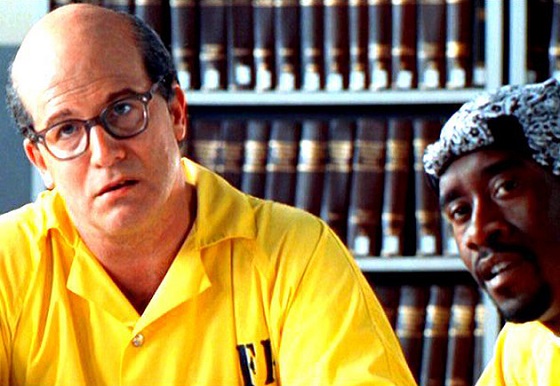
It can get a hell of a lot worse than paying out the ass for protection when doing a stretch on the inside, especially if the deal affords a person legitimate shielding from unsavory elements. In Out of Sight, one got the sense that Ripley (Albert Brooks), a convicted white collar criminal, was indeed getting something for his dough. Granted, the man was bleeding money in exchange for his luxuries and protection, provided by Snoop (Don Cheadle), yet the stocky, balding, entitled businessman was desperately in need of a guardian angel. Snoop provided just that, yet again, it meant that Ripley was at the total mercy of his benefactor. This was illustrated in living color when Snoop shook his charge down in the prison library, and charged three figures for a pillow, along with a hefty tax for eye drops and a goldfish. Were it not for the kind intervention of career criminal Jack Foley (George Clooney), Ripley might have walked out a prison a pauper (or worse, a dead pauper). Luckily for him, Jack began looking out for Ripley not long after the library encounter, and protected the rich asshole on the inside (albeit for the sake of getting information on Ripley’s alleged diamond stash). Compared to some of the others listed today, Ripley certainly didn’t have it all that bad, yet there can be no mistake: the guy was straight-up owned by prison.
9. Tie: Sylvester Stallone and Kurt Russell as Tango & Cash (1989) 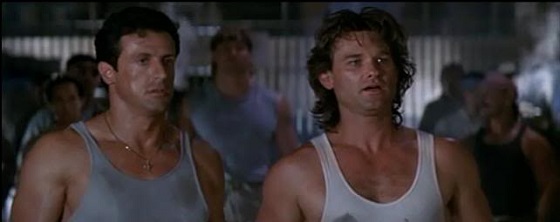
To be fair, police officers Ray Tango (Sylvester Stallone) and Gabriel Cash (Kurt Russell) had a tougher time in prison than most because they had been framed for murder, and erroneously sent to a maximum security prison that was home to many of the crooks that they’d put away over the years. In 1989’s Tango & Cash, all of this was part of a larger set-up to get two of L.A.’s best cops off the streets so that the So-Cal criminal element could solidify their hold on illicit activities in the region. Thus, when Officers Tango and Cash went to prison under the terms of a plea bargain that was supposed to see them in a minimum security setting (and cloistered from the general population), they quickly realized they had been thrown to the wolves. On the inside, the pair was subjected to all manner of threats from angry-as-fuck cons and the bribed guards who couldn’t be bothered to step in and lend an assist. Consequently, the two ex-cops spent the majority of their time in prison fending off assassination attempts that would turn most people into piles of quivering jelly. Escape was the only real option for Tango and Cash, as it was clear that any extended period of time in prison would see one or both of them six feet under. And while it was on a Thunderdome level, the amount of suffering and assault the pair endured didn’t quite add up to the same degree of trauma this next prisoner endured, if only because he was nowhere near as tough to combat it…
8. Will Arnett as Nelson Biederman IV from Let’s Go to Prison (2006) 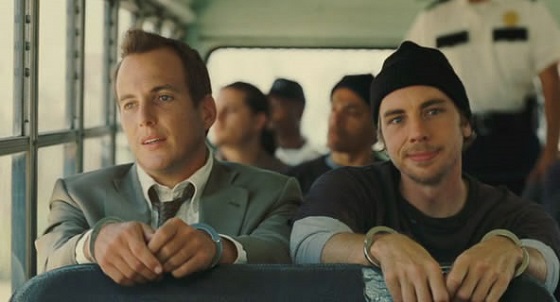
A truly underrated classic, Let’s Go To Prison was everything this list was looking for, and then some. The film’s narrator was John Lyshitski (Dax Shepard), a man who had spent the majority of his life in correctional facilities. Lyshitski got his first term at the age of 8 because an overzealous judge had a hard-on for harsh sentences, a predilection that was reinforced on two other occasions when John came before the very same judge. After his third jail term, Lyshitski plotted his revenge on the magistrate, only to learn that the crotchety old bastard had recently died. The judge’s spoiled, arrogant, entitled son, Nelson Biederman IV (Will Arnett), was still very much alive, however, and Lyshitski turned his attention to getting the guy into the shit-house for a little retribution. Once in prison, Nelson proved to be every bit the delicate cupcake Lyshitski had hoped, and after just a few days Nelson was fending off advances from an aggressive bear, not to mention death threats from the leader of the “White Kingdom.” The judge’s son didn’t fare too well under these circumstances, and came within an eyelash of becoming the recently-murdered bang-bitch of a prison kingpin when a miracle landed in his lap. Nelson eventually got the hang of things on the inside, which led to a nominally happy ending for the guy when everything was said and done. It’s for this reason that the delicate snowflake-turned-hardass only held down our #8 spot, just behind another gentleman who was not at all ready for life on the inside…
7. Harland Williams as Kenny from Half-Baked (1998) 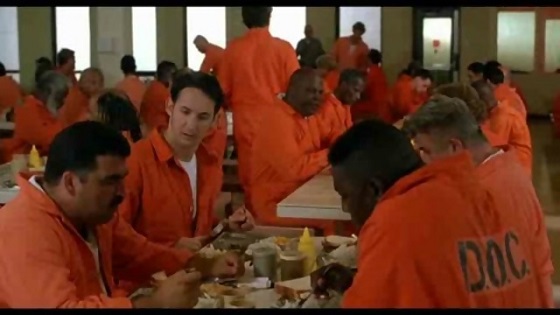
Aw man, if ever there was a soft wad of cookie dough not at all prepared for life on the inside, it was Kenny (Harland Williams) from Half Baked. A kindly Kindergarten teacher with a gentle heart, Kenny never meant to hurt anybody when his post-smoke munchies run took him on a horse-feeding detour. Yet Kenny’s love of animals was ultimately his undoing, for when he fed a New York City police horse, Buttercup, he had no idea that the animal was a diabetic. The impromptu meal killed poor Buttercup and sent Kenny to court, where the unassuming stoner was tried and convicted as a cop killer. Once in jail, Kenny immediately crumbled under the weight of his circumstances, for the “fresh fish” chants and cafeteria intimidation absolutely unhinged the man. When asked how long he might be able to last on the inside, Kenny responded with an hourly estimation rather than a daily or weekly one, which was entirely understandable considering the intimate advances by fellow inmate “Nasty Nate.” Were it not for the fatherly guidance and protection of Squirrel Master (Tommy Chong), Kenny likely would not have made it out of the clink alive. While in prison, Kenny only came close to a beating and rape, yet even this was enough to drive the stoner to the brink of madness (his calendar rant was proof enough of this). Now, for prison intimidation and rape acts that were indeed consummated, we’d have to turn to…
6.) Edward Norton as Derek Vinyard from American History X (1998) 
The only example of a positive transformative institutional experience amongst today’s featured characters, Derek Vinyard (Edward Norton) from American History X was most certainly owned by prison, yet was also a better man for it. In the film, Derek was a young man from Venice Beach, California seduced by the venomous poison spewed by a local Neo-Nazi. The recent death of Derek’s father left a paternal void in his life, one he filled with hatred and misguided theories of racial superiority. A couple hate-crimes later, and Derek found himself locked up for 3 years in Chino, where his Nazi affiliations proved somewhat useful…at first. Embraced by the Neo-Nazi prison gang brain-trust, Derek initially thought he had found himself a community similar to what he’d known on the outside, yet the gang’s political affiliations with National Socialism were practically non-existent. Disillusioned, Derek rejected the Nazis-in-name-only, which led to his isolation on the inside, and a removal of all his protection privileges from the very powerful Swastika syndicate. Derek was raped, beaten, and left to fend for himself in a prison filled with people who hated him because he was white, or even worse: a traitor. It was only through the actions of a friendly co-worker that Derek got out alive, something he acknowledged both to the man, and himself. Derek left prison a reformed individual, and turned all his energies towards the efforts of cleaning up the mess he’d made prior to going inside. Owned by prison, to be sure: yet Derek made the best of it.
5. Robert Blossom as Doc from Escape from Alcatraz (1979) 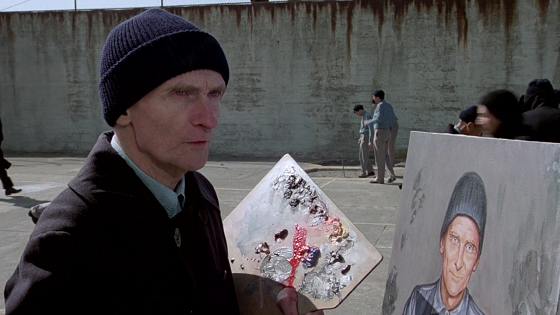
Although a person might be able to make a case that the star of Escape from Alcatraz, Frank Morris (Clint Eastwood) owned prison, rather than the other way around, his friend Doc (Robert Blossom) most certainly fell into the latter camp discussed here today. Indeed, although Morris held the respect of his fellow inmates, orchestrated a masterful escape, and kept the rapists at bay with relative ease, Doc had a tougher time with things. An older fellow with a kindly disposition and a love of painting, Doc mostly kept to himself on Alcatraz, and even seemed to get preferential (or at least deferential) treatment from the institution’s notoriously tough guards. Yet the prison’s sadistic warden (Patrick McGoohan) wasn’t a big fan of hope, or any kind of contentment amongst his inmates. To this end, the warden ordered the confiscation of all of Doc’s painting supplies, and revoked the old man’s art privileges. This depravity robbed Doc of his emotional anchor, not to mention whatever had been keeping him going in the hellish existence that was his life. As a result, Doc took a hatchet to his fingers, and cut about a hand’s worth off in one hack. The act was deliberate, premeditated, and a clear message to those in charge that without his art, Doc had little use for his hands. It was a desperate move from a man who had lost everything, including all hope. And as this next film illustrated, in prison, hope is about the only thing an inmate has that’s worth a damn…
4. James Whitmore as Brooks Hatlen from The Shawshank Redemption (1994) 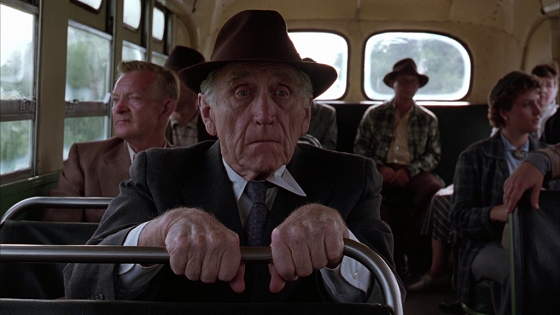
Although The Shawshank Redemption is primarily the story of the friendship that blossomed between Red (Morgan Freeman) and Andy (Tim Robbins), in many ways the emotional pulse of the film belonged to Brooks Hatlen (James Whitmore). If the overriding message of the movie was one concerning hope, and the importance of this sentiment in a world designed to choke off any semblance of optimism, then Brooks represented the consequence of an institutional life unmoored from happy expectations. Although the audience only got a look at Brooks during the last few years at Shawshank, the film made it clear that the old man had long since surrendered his identity to the prison, and transitioned into a life wholly connected to his function within its walls. Brooks had adjusted so completely to his life on the inside, and given up all hope of living in the real world ever again, that when he was actually released he was unable to cope with freedom. As Andy tried to explain to Red late in the film, when Brooks acquiesced to the harsh realities of prison life, when the kindly old man gave up hope, he lost that piece of himself that made him a human being. Without that, and removed from an environment where everything he did and everywhere he went was rigidly controlled, Brooks crumbled. It may have taken fifty-odd years, but prison did finally get to the man, and it ultimately cost Brooks his life.
3. Kevin Bacon as Henri Young from Murder in the First (1995) 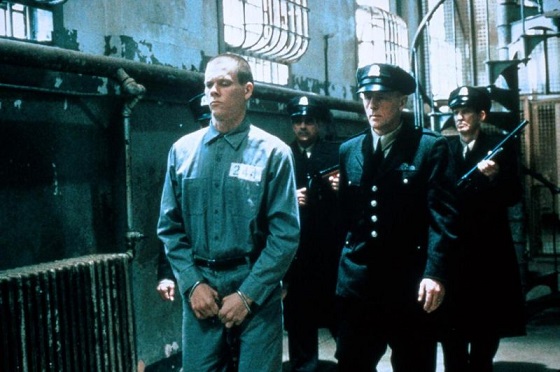
Murder in the First told the story of real-life Alcatraz prisoner Henri Young (Kevin Bacon), who did indeed serve part of his sentence on “The Rock,” and was tried for murdering a fellow prisoner during his time there. Most everything else in the film was an exaggeration at best, and outright fabrication at worst. Christian Slater played Henri’s defense attorney, James Stamphill, who really did try to get Henri acquitted for the jailhouse murder on the grounds that the cruel surroundings of Alcatraz created the conditions that brought about the murder. Yet the movie ginned up a lot of nonsense about Henri’s background as a kindly country rube, and his run-in with a malicious prison warden that sadistically punished the misguided kid via YEARS in solitary confinement. Murder in the First held that the prolonged exposure to dungeon-like conditions turned Henri mad, and reduced him to an almost animal state that led to murder and borderline psychosis. Three years in the hole would be enough to break any man or woman, and the film did a decent job showing how thoroughly Henri had fallen apart as a result (hence his spot here, at #3). His death on the inside capped off a savage journey through the penal system, and might have been enough to push him past this next inmate had it actually been true (the real Henri Young was released in 1972, jumped bail, and was never seen again).
2. Paul Newman as Lucas Jackson from Cool Hand Luke (1967) 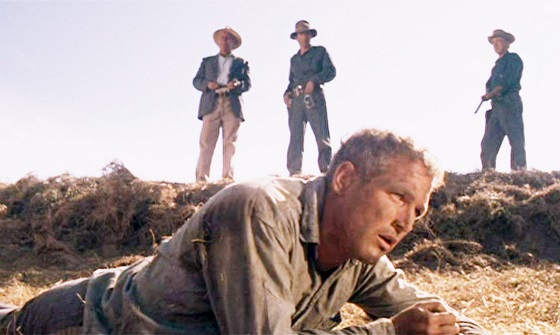
This dummy, jeez. In Cool Hand Luke, when Luke (Paul Newman) went to a chain gang work farm prison for cutting the heads off parking meters, he was determined to hold onto his dignity and self respect. This was no easy task for a prisoner, as the guards and the strict warden in charge wielded absolute and total control over the inmates. Yet Luke wasn’t the kind of guy to just sit back and take whatever life handed him: no, he was a fighter through and through. What began as an effort to establish his identity as an iconoclast amongst the prison population turned into a struggle against the establishment, one that persecuted him without cause. When Luke was put in solitary confinement in anticipation of a possible escape, the man resolved to do just that: bust loose. After his second unsuccessful attempt at getting (and staying) out, Luke was more or less broken. Solitary confinement mixed with a seemingly endless chore of digging a hole, then filling back up, and then digging it again reduced Luke to a sniveling pile of weeping humanity, one that appealed to God and the guards alike for mercy. This led to one final, mad attempt at securing his freedom, one that Luke knew would end either in success or his death. At that point it didn’t matter any longer, for Luke had gone up against the prison system, and got his ass chewed up and spit out for the effort. Still, it could have been worse, Luke could have endured this agony as a kid…
1. Tie: Jason Patric, Brad Pitt, Ron Eldard, and Billy Crudup as Shakes, Michael, John and Tommy from Sleepers (1996)
These poor, dumb kids. Jailed for a childish prank gone wrong, in Sleepers, Shakes, Tommy, Michael, and John suffered terribly at the hands of a cruel group of guards at a juvenile prison. The pre-teens were beaten and raped on a regular basis, and as a result they developed a hard shell of callous disregard for people and a world that could not help them when they were at their most vulnerable. Although all four of them went to prison boys, they left the institution men: men who had seen and experienced more horror than most will know in a lifetime. Physical and sexual abuse at such a young age will change any person, and although Shakes (Jason Patric) and Michael (Brad Pitt) came away from it all mostly well-adjusted and intact, John (Ron Eldard) and Tommy (Billy Crudup) turned to the dark side, and transformed into hardened criminals. As fate would have it, the latter two gentlemen were in a bar one night about fourteen years after their release from their adolescent nightmare when they noticed the head prison guard rapist eating in the corner. John and Tommy brazenly shot the bastard then and there, then worked with Shakes, a newspaper reporter, and Michael, now the assistant D.A., to beat the rap and expose the corruption that led to the murder. This they managed to do, and at the end of the day, the guards and the prison that chewed them up and spit them out were exposed and vilified. John and Tommy didn’t last much longer, though, and died shortly after the trial. Although their experiences on the inside led to the corruption of their souls, the murder of a monster, and their ultimate demise, they were just two among thousands that were ruined by prison, which robs a person not just of their freedom, but too often their humanity as well.




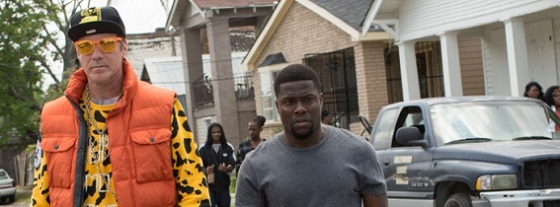
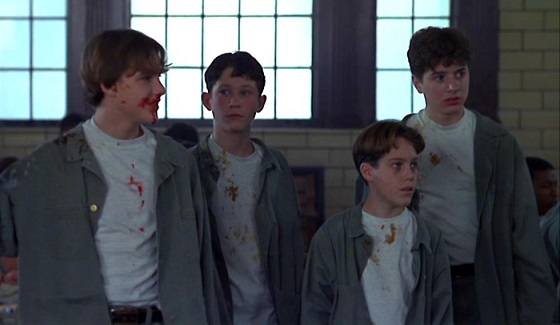

Comments on this entry are closed.